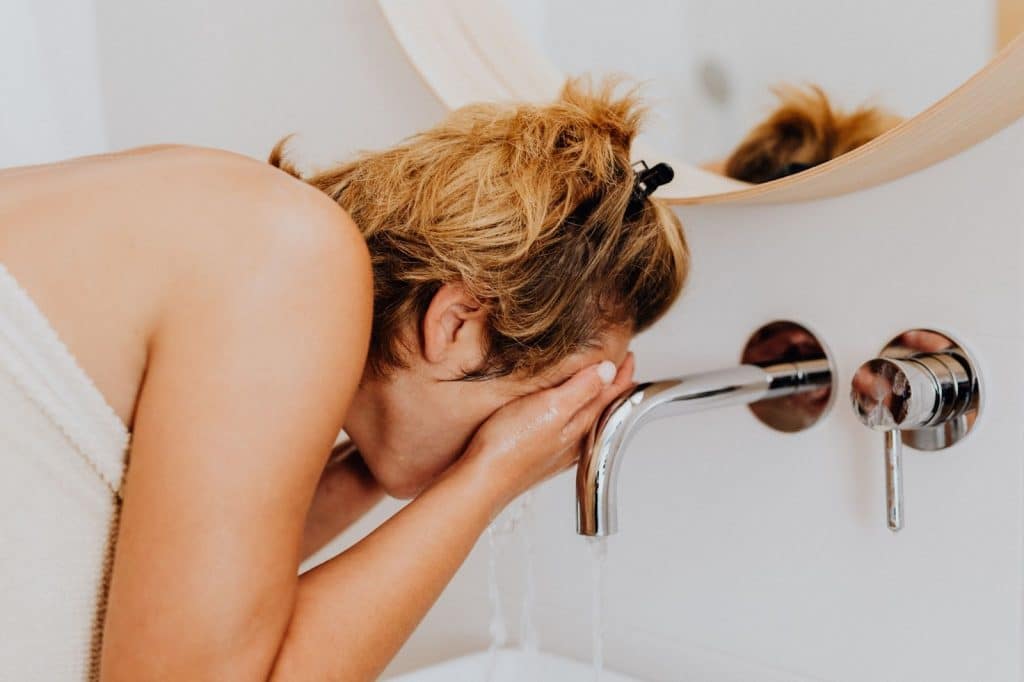If you have an oily skin type, we know how horrible it feels to wake up to your face being super oily. It is a horrible situation.
Let’s take a look at why it happens. This article will go over 3 causes of oily skin in detail and explore ways to deal with them.
What Causes Oily Face at Night?
Here are 3 reasons why your face gets oily while you sleep:
- Poor skincare routine with little hydration
- Overwashing with stripping face wash
- Sweat
To fix the problem, you have to understand why it is happening. Let’s explore each of the 3 aforementioned factors in detail.
Read also: Does side sleeping affect face shape?
1. Poor Skincare Routine with Little Hydration
Oily skin produces a lot of sebum when you don’t hydrate it enough. One would think that your skin already has excess water since it seems to be excreting it so much. However, that is far from true.
Your body secretes water and moisture throughout the day. But when you don’t drink enough water or have high enough moisture levels, this secretion can leave you dehydrated.
In response, your skin releases sebum or oils to seal in your body’s water. Since water and oil don’t mix, it is difficult for moisture to leave your body when there’s a layer of sebum all over your face.
2. Over Washing with Stripping Face Wash
Another reason why you may be regularly waking up with an oily face is that you’re washing your face too much. Sure, it can be tempting to scrub off sebum from your skin regularly, but it is very bad for you.
Any oil on your face is being produced to seal your skin’s moisture. When you take that oil away, your body will just produce more. In most cases, it will secrete more sebum than it did the time before for good measure.
Over time this cycle continues, and eventually, you end up in a continuous battle with your skin. You strip off the oil on your face while your skin produces more oil.
It fails to understand why the sebum keeps disappearing, and you’re left confused about why the oil on your face keeps increasing.
3. Sweat
Sweat glands are present right next to your oil glands. These eccrine and sebaceous glands produce a lot of lipid and fat separately.
However, if you have oily skin with a bad skincare routine and the oil glands start producing sebum while you’re sweating, you will end up with a thick layer of oil on the surface of your skin. This is one of the main reasons why pillows turn yellow after a while.
How Can I Prevent My Face from Getting Oily When I Sleep?
So, there are 3 main reasons why you may be waking up with an oily face in the morning. Each of them is primarily caused by overly active sebaceous glands.
Overly active sebaceous glands can be fixed by doing 1 simple thing: moisturize your skin. Here are 3 ways to do this:
- Drink plenty of water.
- Moisturize your skin using a gel or lotion daily.
- Wash your face with a non-stripping face wash once a day.
1. Drink Plenty of Water

The first tip is pretty straightforward: drink a lot of water!
Your body transports minerals and nutrients from one place to another using water. So if you don’t have enough of it, you can’t get access to them.
Also, if your body has a good supply of water, your skin doesn’t have to safeguard every ounce of moisture in it. So it is likely to produce less sebum to trap water.
2. Moisturize Your Skin Using A Gel or Lotion Daily
Moisturizers are great for oily skin. They don’t add water to your skin but help hold the water in the outer layer of your skin to keep it hydrated.
Dry skin is just as bad as oily skin, so this moisture is super important.
When water isn’t trying to leave your skin, your body has no reason to begin producing excess sebum to seal it in. Hence, you automatically have a less oily face in the morning.
Here are some tips to help you find the best moisturizer:
- Lotions and gels are water-based and don’t aggravate oily skin. They’re your best friend so you should get your hands on one as soon as possible.
- Look for skin care products labeled ‘oil-free.’
- Choose a moisturizer with sunscreen in it to limit the number of products you need to put on your face.
Finding the appropriate hydrating agent might take a little while. But once you find it and start moisturizing oily skin, you’ll notice excess oil production go down drastically.
3. Wash Your Face With A Non-stripping Face Wash Once A Day

The last tip we have for you is to wash your face with a non-stripping face wash once a day.
Non-stripping face washes are generally gentle products that don’t remove all the oil from your face. They leave a small amount which is enough to assure your skin that it doesn’t need to produce excess sebum while also being small enough that you don’t notice it.
Note that all oil production by your skin isn’t bad. Some natural oils are really good for you and shouldn’t be removed. Non-stripping face washes ensure this.
Wash your face once a day because doing more than that will aggravate your sebaceous glands.
You can, of course, splash your face with tap water as much as needed. Just do not use any product more than once, and excess sebum production will decrease in no time.
Read also: Can you sleep with Aztec secret healing clay?
4. Keep Cool at Night
If you are experiencing an oily face due to sweating at night, you can do several things to reduce this and both help reduce your greasy complexion and improve your sleep quality.
One of the best things to do is to keep cool by using a silk pillowcase. Silk pillowcases move heat away from your face and head and also absorb any sweat you may produce.
You can also experiment with different materials for your sheets. For example, you may find microfiber better than jersey sheets or alternatively you might find bamboo sheets cooling against your skin.
As well as changing your pillowcase and sheets, you may decide to sleep with a window open to allow some cool breeze accross your face at night.
Conclusion: Why Your Face Gets Oily When You Sleep
All skin types produce sebum to trap moisture. However, overactive sebaceous glands in oily skin tend to overdo this. That’s what’s happening to you if you’re waking up with a thick layer of oil on your face every morning!
The main reason why this is happening is that your skin is scared of being dehydrated and is trying its best to retain as much moisture as possible.
You can reassure your skin by ensuring that it has enough moisture. Drink a lot of water and use a good quality gel or lotion moisturizer. Also, do not use a stripping face wash because that aggravates sebaceous glands.
FAQ Section
How can I prevent my face from getting oily when I sleep?
Moisturize your face before sleeping. Your skin produces sebum during the night to trap moisture. However, moisturizers do the same thing. So if you can beat your sebaceous glands to it, they won’t feel the need to excrete any oils.
Why is my skin oily when I wake up?
The sebaceous glands in your facial skin are overactive and excrete excess sebum. You might not be drinking enough water or moisturizing your skin enough. You could also just be sweating a lot during your sleep which can happen if you live in a hot region or experience cold sweats.
Is an oily face good?
Having excessively oily skin means your skin isn’t hydrated enough. It likely also means clogged pores and acne breakouts.
But having an oily face can also prevent wrinkles in old age. So if you can bring the oiliness down to safe levels using the techniques outlined here, your oily face should be fine.
